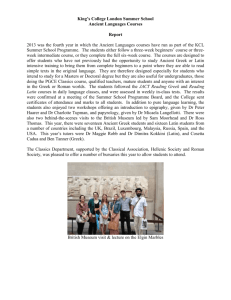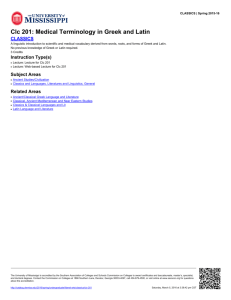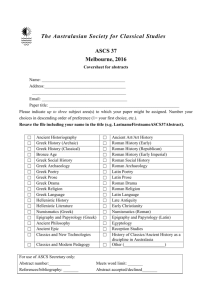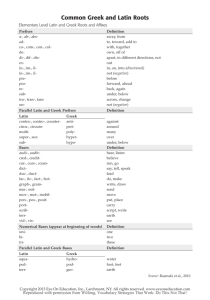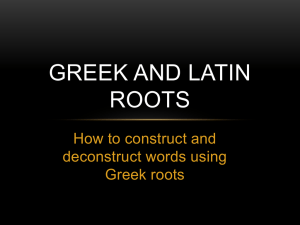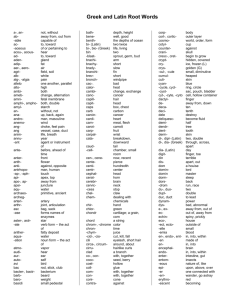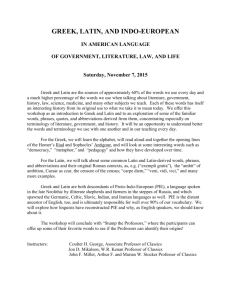Explore Ancient Greece and Rome Fall 2015 courses
advertisement
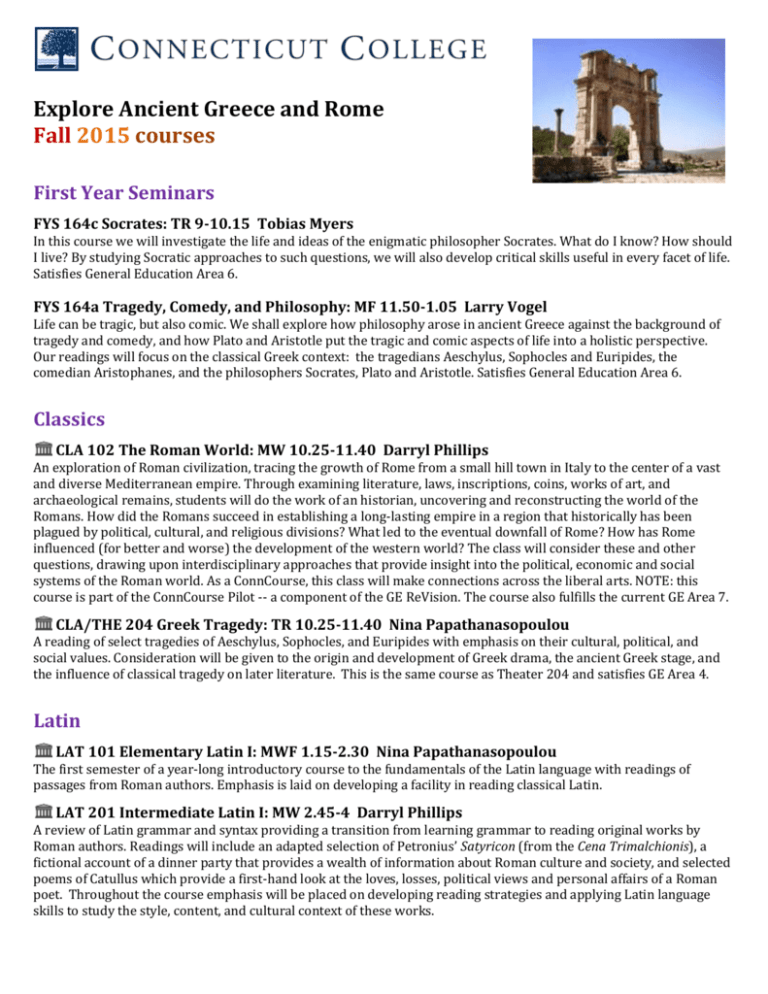
Explore Ancient Greece and Rome Fall 2015 courses First Year Seminars FYS 164c Socrates: TR 9-10.15 Tobias Myers In this course we will investigate the life and ideas of the enigmatic philosopher Socrates. What do I know? How should I live? By studying Socratic approaches to such questions, we will also develop critical skills useful in every facet of life. Satisfies General Education Area 6. FYS 164a Tragedy, Comedy, and Philosophy: MF 11.50-1.05 Larry Vogel Life can be tragic, but also comic. We shall explore how philosophy arose in ancient Greece against the background of tragedy and comedy, and how Plato and Aristotle put the tragic and comic aspects of life into a holistic perspective. Our readings will focus on the classical Greek context: the tragedians Aeschylus, Sophocles and Euripides, the comedian Aristophanes, and the philosophers Socrates, Plato and Aristotle. Satisfies General Education Area 6. Classics CLA 102 The Roman World: MW 10.25-11.40 Darryl Phillips An exploration of Roman civilization, tracing the growth of Rome from a small hill town in Italy to the center of a vast and diverse Mediterranean empire. Through examining literature, laws, inscriptions, coins, works of art, and archaeological remains, students will do the work of an historian, uncovering and reconstructing the world of the Romans. How did the Romans succeed in establishing a long-lasting empire in a region that historically has been plagued by political, cultural, and religious divisions? What led to the eventual downfall of Rome? How has Rome influenced (for better and worse) the development of the western world? The class will consider these and other questions, drawing upon interdisciplinary approaches that provide insight into the political, economic and social systems of the Roman world. As a ConnCourse, this class will make connections across the liberal arts. NOTE: this course is part of the ConnCourse Pilot -- a component of the GE ReVision. The course also fulfills the current GE Area 7. CLA/THE 204 Greek Tragedy: TR 10.25-11.40 Nina Papathanasopoulou A reading of select tragedies of Aeschylus, Sophocles, and Euripides with emphasis on their cultural, political, and social values. Consideration will be given to the origin and development of Greek drama, the ancient Greek stage, and the influence of classical tragedy on later literature. This is the same course as Theater 204 and satisfies GE Area 4. Latin LAT 101 Elementary Latin I: MWF 1.15-2.30 Nina Papathanasopoulou The first semester of a year-long introductory course to the fundamentals of the Latin language with readings of passages from Roman authors. Emphasis is laid on developing a facility in reading classical Latin. LAT 201 Intermediate Latin I: MW 2.45-4 Darryl Phillips A review of Latin grammar and syntax providing a transition from learning grammar to reading original works by Roman authors. Readings will include an adapted selection of Petronius’ Satyricon (from the Cena Trimalchionis), a fictional account of a dinner party that provides a wealth of information about Roman culture and society, and selected poems of Catullus which provide a first-hand look at the loves, losses, political views and personal affairs of a Roman poet. Throughout the course emphasis will be placed on developing reading strategies and applying Latin language skills to study the style, content, and cultural context of these works. LAT 320 Readings in Latin Poetry: Vergil's Eclogues: MW 1.15-2.30 Tobias Myers In this course students will read, in Latin, the haunting and mysterious Eclogues, which Vergil wrote long before the Aeneid. While sharpening our skills on beautiful Latin poetry, we will trace the ways in which the musical shepherds and playful nymphs of Vergil's fantastical universe serve to stage the tensions, fears, and longings of the war-weary people of Rome. Greek GRK 101 Elementary Greek I: MTR 11.50-1.05 Tobias Myers The first semester of a two-semester course introducing students to the fundamentals of the ancient Greek language. While tackling progressively more challenging puzzles of grammar, students will learn Greek using sentences taken from some of the earliest surviving scientific, historical, literary, and religious texts in the West, including Euclid, Homer, Plato, and the New Testament. GRK 231/331 Greek Oratory: TR 1.15-2.30 Nina Papathanasopoulou Students will expand their facility with ancient Greek by studying works of Plato, Lysias, and Sophocles. Students will read, analyze, and compare selections from Athenian defense speeches: Socrates’ speech in his trial for impiety and corrupting the youth, possibly the most widely read defense speech of all time; Lysias’ speech for a man on trial for murdering his wife’s lover; and the speech of Sophocles’ tragic heroine, Antigone. Art History AHI 101 Survey of the History of Art I: TR 1.15-2.30 and WF 10.25-11.40 Joe Alchermes An introduction to the history of Western art from its beginnings – starting with Greek and Roman art – to the period of Gothic cathedrals. Painting, sculpture, architecture, and decorative arts in their social, cultural, and historical contexts. Emphasis on new discoveries and theories that have significantly changed our understanding of ancient and medieval art. This course satisfies General Education Area 7. Philosophy PHI 201 History of Ancient Philosophy: MW 10.25-11.40 Larry Vogel A study of classical Greek philosophy, with special attention to the pre-Socratics, Socrates, Plato, and Aristotle, and a consideration of the influence of classical philosophy on the history of Western thought. This course satisfies General Education Area 6 and is a Writing course. indicates that the course counts toward the Classics major. For more information visit our Classics website at http://www.conncoll.edu/academics/majors-departmentsprograms/departments/classics/, or follow us on Facebook at Classics at Connecticut College (fb.com/connclassics).
